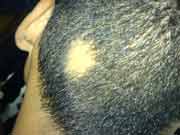Zinc inversely correlated with disease duration, severity, and resistance to therapy
FRIDAY, July 10, 2015 (HealthDay News) — Lower serum zinc levels are associated with worse outcomes in patients with alopecia areata, according to a study published online July 3 in the International Journal of Dermatology.
Nermeen S.A. Abdel Fattah, M.D., from Ain Shams University in Cairo, and colleagues compared serum zinc levels between patients with newly diagnosed (25 participants) and resistant lesions of alopecia areata (25 participants) and in age- and sex-matched healthy controls (50 participants).
The researchers found that patients with alopecia areata had significantly lower serum zinc levels, compared to controls. Patients with resistant alopecia areata also had significantly lower zinc levels compared to patients with newly diagnosed disease. There was a significant inverse correlation between serum zinc level, severity of disease, and disease duration in all patients, as well as in patients with resistant alopecia areata.
“Assessment of serum zinc level in patients with alopecia areata appears useful as a marker of severity, disease duration, and resistance to therapies,” the authors write. “Further studies are therefore recommended to evaluate the role of zinc supplements in patients with alopecia areata, especially those with severe, longstanding, or resistant lesions.”
Copyright © 2015 HealthDay. All rights reserved.








